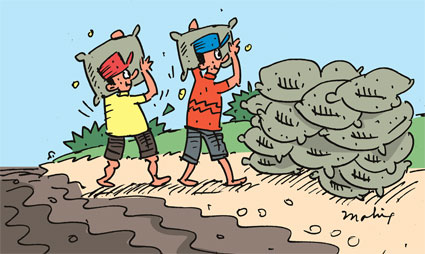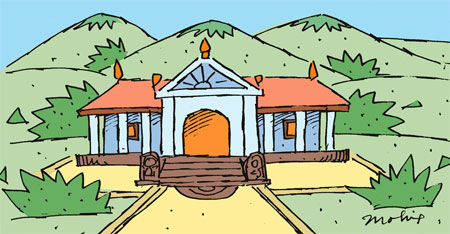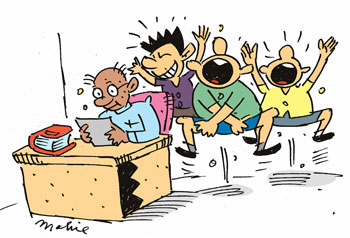|

by R. S. Karunaratne
Simple present tense
We use the simple present tense to refer to regular actions or
habits, current situations or facts in general.

Poisonous gases destroy the ozone layer.
The Louvre in Paris contains some of the world’s masterpieces of art and
sculpture.
I warn you not to go into that section of the city because it is highly
dangerous.
Semini works as a legal assistant in her brother’s firm.
All motorists have to follow traffic regulations.
We use the simple present tense to refer to more long-lasting or
permanent situations.
The king’s palace stands on 30 acres of rolling hills and plains.
Ravi holds an important post in a government department.
The earth rotates around the sun.
Honesty is the best policy. (Proverb)
Crime does not pay.
We use the simple present tense to refer to actions which are going
to happen very soon or future actions which happen regularly according
to a schedule.
Hurry up! The train leaves in five minutes.
The trade union holds a meeting with the management next Monday.
A fall in the value of the rupee affects everybody.
People lay sandbags along the river bank fearing another flood.
My flight to London takes off in another two hours.
We use the simple present tense to refer to short actions happening
at the time of speaking.
She admits that what she said earlier was not true.
You stay here until your mother returns.
I feel the same way you do.
I don’t grumble. Tell me anything.
Some members object to your suggestion.
[Activity]
Rewrite the following sentences if they are incorrect. Check your
answers with the key.
1. Abraham manage a drapery store in the city.

....................................................
2. They lives in an apartment overlooking the lagoon.
.....................................................
3. I promises that I’ll do my best in the GCE O/L examination.
......................................................
4. The Colombo Museum contain masterpieces of art and sculpture.
......................................................
5. Some children stays up to watch live telecast of cricket matches.
.......................................................
6. Kamal work as an editorial assistant at a prestigious newspaper
organisation.
........................................................
7. We elects a new club president every year.
.........................................................
8. Sam show great promise as a young violinist.
.........................................................
9. Health workers demands higher salaries every year.
.........................................................
10. Janet works as an assistant film director.
.........................................................
Key:
1. Abraham manages a drapery store in the city.
2. They live in an apartment overlooking the lagoon.
3. I promise that I’ll do my best in the GCE O/L examination.
4. The Colombo Museum contains masterpieces of art and sculpture.
5. Some children stay up late to watch live telecast of cricket matches.
6. Kamal works as an editorial assistant at a prestigious newspaper
organisation.
7. We elect a new club president every year.
8. Sam shows great promise as a young violinist.
9. Health workers demand higher salaries every year.
10. Correct.
Starters
Use of prepositions
[Part 1 ]
The combination of words and prepositions in English is something you
need to know for almost every sentence you write or speak has at least
one preposition. Beginning from today, let’s learn how prepositions are
used in English.

[From ]
We use “from” to indicate who or what is the source or provider of
something.
Much of my financial support came from one of my rich uncles.
We use “from” when we say where somebody or something started off.
He comes from Jaffna.
We use “from” to say where somebody works.
He is from the SLBC. (Sri Lanka Broadcasting Services)
When we move “from” a place, we leave it and go somewhere else.
My grandparents came from India many years ago to settle down in Sri
Lanka.
When we go “from” place to place, we go to several places.
I saw the tourist wandering from room to room.
You take somebody or something “from” another person.
The children were taken forcibly from their parents.
If you return “from” doing something, you return after doing it.
The soldiers have not come back from the battle field.
We use “from” after the adjective “fresh”.
She is fresh from school. (She is a recent school leaver.)
When we see something “from” a particular place, we are in that place
when we see it.
From behind his desk, he heard them giggling!
If something is made “from” a particular substance, that substance is
used to make it.
You can make soap from coconut oil.
We use “from” when we say that something is not the same as something
else.
She was quite different from what I expected.
We use “from” when mentioning the cause of something or the reason for
something.
We get a tremendous amount of pleasure from the Queen’s visit.
[To ]
If you go “to” a place, you move towards it.
Narmada went to the airport to bid farewell to her friends.
If you go “to” a party, you go where it is held.
“You must come to dinner,” she insisted.
If something is attached “to” something larger or fixed, the two things
are joined together.
We tied the robber to a tree.
We use “to” when indicating the position of something.
The robber turned to the north and disappeared.
We use “to” when indicating who or what receives something.
I gave a generous tip to the waiter.
When we say something “to” somebody, we want that person to listen to
us.
The villagers complained to the police about the robberies.
We use “to” when indicating somebody’s feelings about an event or
situation.
To her relief, the child’s fever subsided after some time.
We use “to” when indicating a sound that occurs at the same time as an
action.
The child woke to the sound of rain pattering on the roof.
We use “to” when indicating the time at which something ends.
The farmer worked from dawn to dusk.
We use “to” when stating a time which is less than 30 minutes before an
hour.
It’s quarter to nine.
We use “to” in ratios and rates.
The mason uses four parts of sand to one of cement.
Forming verbs from nouns
A familiarity with word families will help you to enrich your
vocabulary. Write the verb against each noun and check your answers with
the key.
Nouns
Verbs
1. Imagination ....................
2. Impression .................
3. Improvement ..................
4. Increase ....................
5. Infection ....................
6. Inflation ....................
7. Information ..............
8. Injury ....................
9. Insistence ....................
10. Instruction ..............
11. Intention ....................
12. Interruption..................
13. Interview ....................
14. Introduction .................
15. Invention ....................
16. Invitation ..............
17. Involvement ..................
18. Item ....................
19. Judgement ....................
20. Keeping ....................
21. Killing ....................
22. Knowledge ....................
23. Laughter ....................
24. Leadership ..............
25. Learning ....................
26. Legality ....................
27. Length ....................
28. Loss ....................
29. Low ....................
30. Marriage ....................
31. Material ....................
32. Meaning ....................
33. Measurement ..................
34. Memory ....................
35. Minimum ....................
36. Mixture ....................
37. Modernization ................
38. Moral ....................
39. Nation ....................
40. Nature ....................
Key:
1. imagine
2. impress
3. improve
4. increase
5. infect
6. inflate
7. inform
8. injure
9. insist
10. instruct
11. intend
12. interrupt
13. interview
14. introduce
15. invent
16. invite
17. involve
18. itemize
19. judge
20. keep
21.kill
22. know
23. laugh
24. lead
25. learn
26.legalize
27. lengthen
28. lose
29. lower
30. marry
31. materialize
32. mean
33. measure
34. memorize
35. minimize
36. mix
37.modernize
38. moralize
39. nationalize
40. naturalize |



